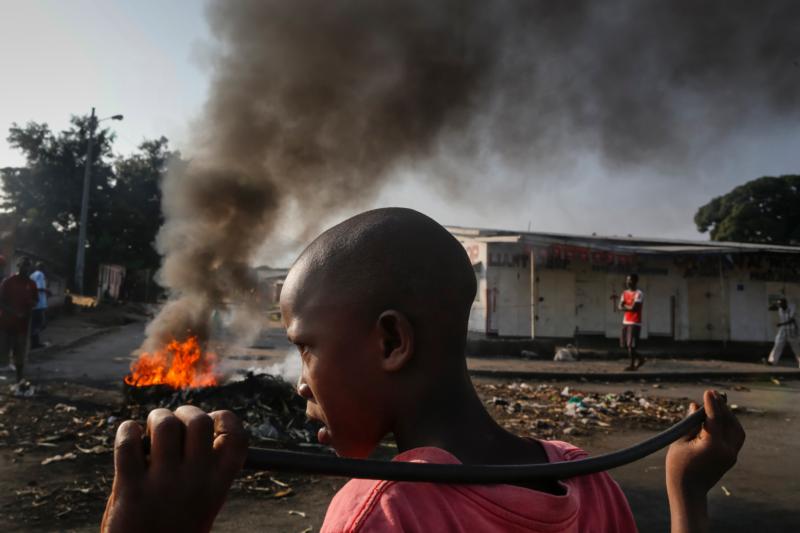
A boy looks on as he holds a stick in front of a burning barricade during a 2015 demonstration in Bujumbura, Burundi, against President Pierre Nkurunziza’s bid for a third term. A Catholic aid official urged the government of Burundi not to threaten the church, which he said plays an important role in sustaining society. (CNS photo/Dai Kurokawa, EPA)
by Jonathan Luxmoore
OXFORD, England (CNS) — A Catholic aid official urged the government of Burundi not to threaten the church, which he said plays an important role in sustaining society.
“The church is engaged in peacemaking by bringing communities together and explaining to politicians the importance of talking to each other,” said Patrick Nicholson, communications director of Caritas Internationalis. “But it’s also giving crucial support to agriculture, schooling and multiple social services, including health care, which would be in a dramatic state without the church’s 101 hospitals and clinics. People would face great hardships if the church’s work was discontinued.”
Burundi was plunged into chaos in 2015 following President Pierre Nkurunziza’s acceptance of a third term in apparent violation of the constitution. The government banned demonstrations and restricted the media, and thousands of Burundians — including the vice president of the constitutional court — fled to neighboring countries.
The bishops said the constitution was clear that the president could not serve more than two terms, insisted the media should be allowed to do its job, and urged young people not to be manipulated.
This March, the bishops’ conference said Burundi stood “at a crossroads,” adding that its future would depend on dialogue “between politicians with a vision for the country, who love the nation and its citizens more than their own interests.”
The statement said the “continuing killings and disappearances of people whose bodies are discovered in mass graves” had caused problems with the international community, which had worsened the situation by “depriving the country of financial aid.”
On March 26, Pascal Nyabenda, president of the National Assembly, accused the Catholic Church of playing a “purely political, not spiritual role,” and said the government would not talk to “sponsors of terrorism” and “insurgent individuals who participated in the destabilization of democratically elected institutions.”
“The Catholic Church has been implicated in almost all our country’s crises since the first missionaries arrives as precursors of European colonizers,” he said.
“The will to divide Christians has been expressed, sometimes openly and sometimes in half-words, by certain Catholic Church officials. So has the desire to set Christians against political party members, which raises questions about the real mission of clergy leaders in Burundi. Such attitudes must change if church leaders are to continue their main mission of preaching the good news.”
Catholic News Service repeatedly tried to contact the bishops’ conference in Burundi, but calls were not answered.
In an April 5 interview, Nicholson, who recently visited Burundi, noted that the country’s crisis was essentially political, adding that “Catholics haven’t been targeted till now.”
“The church has played a nonpolitical role in seeking to bring the political sides together in dialogue. This shouldn’t be a reason for acting against it,” he said.
Under an April 2 resolution, the U.N. Security Council will consider deploying U.N. police to the country, where more than 600 people have been killed and 250,00 have fled abroad to escape roundups by pro-government paramilitaries, amid fears of a resurgence of a 1993-2005 civil war that left about 300,000 people dead.






